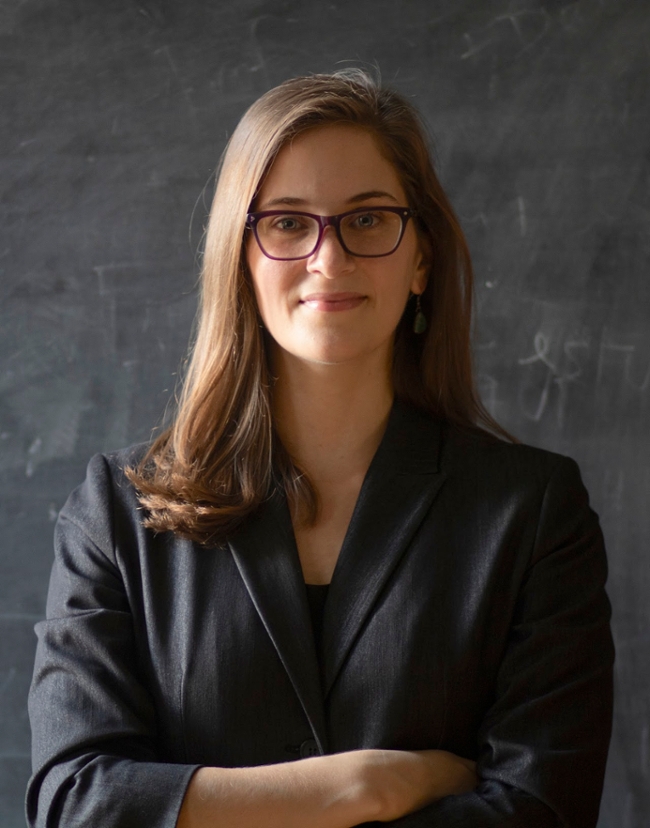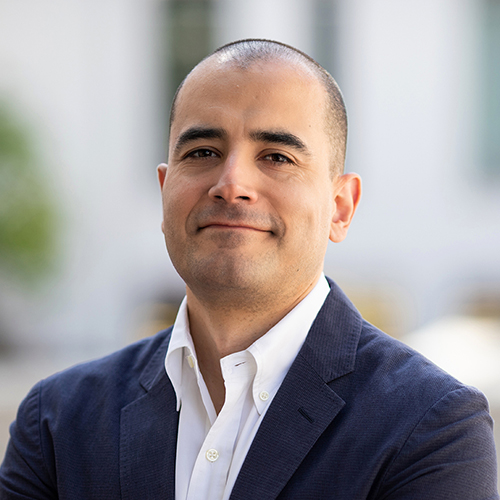Faculty
The Summer Institute will be a highly collegial training program for advanced graduate students and junior faculty led by political scientists from across the discipline who employ EITM approaches in their research. Below is a list of the faculty participants.
Sean Gailmard
Sean Gailmard is Professor in the Travers Department of Political Science at the University of California, Berkeley. Professor Gailmard studies the relationship between principal-agent problems and institutions of government. He has applied this perspective in American politics to understand executive branch structure and political accountability in the U.S. His research has focused on the trade-off between expertise and political responsiveness in the bureaucracy, historical dimensions of the presidency and its relation to the bureaucracy, congressional control of bureaucratic discretion, the internal organization of Congress, and electoral accountability in the U.S. Senate.
Previous research has analyzed models of rational choice by non-selfish actors in laboratory experiments on collective decision making. He is also the author of Learning While Governing: Expertise and Accountability in the Executive Branch (2012, University of Chicago Press, with John W. Patty), which won the 2013 William H. Riker Prize from the American Political Science Association (Political Economy Section) as the best book in political economy, as well as Statistical Modeling and Inference for Social Science (2014, Cambridge University Press), a Ph.D.-level textbook. He has published research in leading social science journals, including the American Political Science Review, American Journal of Political Science, and Journal of Politics.

Scott Tyson
Scott Tyson is an Associate Professor at Rochester University, department of Quantitative Theory and Methods. His research focuses on formal political theory, political economy, conflict, authoritarian politics, experimental design, and theoretical implications of emperical models. He is an Associate Editor for formal theory at Political Science Research & Methods, the Journal of the European Poliical Science Association.

Monika Nalepa
Monika Nalepa (PhD, Columbia University) is a Professor of political science at the University of Chicago. With a focus on post-communist Europe, her research interests include transitional justice, parties and legislatures, and game-theoretic approaches to comparative politics. Her first book, Skeletons in the Closet: Transitional Justice in Post-Communist Europe was published in the Cambridge Studies in Comparative Politics Series and received the Best Book award from the Comparative Democratization section of the APSA and the Leon Epstein Outstanding Book Award from the Political Organizations and Parties section of the APSA. She has published her research in Perspectives on Politics, the Journal of Comparative Politics, World Politics, Journal of Conflict Resolution, Journal of Theoretical Politics, Studies in Logic and Rhetoric, and Decyzje. Her current work centers on how transitional justice mechanisms contribute to the quality of democracy. A centerpiece of this work is the Global Transitional Justice Dataset, funded by the National Science Foundation.

John Patty

Maggie Penn
Maggie Penn a Professor of Political Science at Emory University. She is a formal political theorist whose work focuses on social choice theory and political institutions. She regularly teaches undergraduate courses on electoral systems and agent-based modeling as well as graduate courses on positive political theory. Her work has been published with Cambridge University Press and in the American Journal of Political Science, Journal of Politics, Journal of Theoretical Politics, Mathematical & Computer Modeling, Political Analysis, Political Science Research & Methods, PS: Political Science and Politics, Public Choice, Social Choice & Welfare, The Good Society, and Complexity.

Tara Slough
Tara Slough is an Associate Professor in the Wilf Family Department of Politics at New York University. She writes on the political economy of institutions and development. Her current research focuses on the comparative study of bureaucracies and on the research design. Tara's recent work appears in journals of Politicas, Science, and the Proceedings of the National Academy of Sciences, among others. Tara recently earned a PhD from Columbia University.

Emily Sellars
Emily Sellars is an Assistant Professor in the Department of Politcal Science at Yale University. Before coming to Yale, She was an assistant professor in the Bush School of Government and Public Service at Texas A&M University and a postdoctoral scholar at the University of Chicago's Harris School of Public Policy.
Her dissertation, “Essays on Emigration and Politics,” received APSA’s Mancur Olson Award for the Best Dissertation in the Field of Political Economy in 2017. Sellars research interests are at the intersection of political economy and development economics.

Justin Grimmer
Justin Grimmer is the Morris M. Doyle Centennial Professor in Public Policy in Stanford University's Department of Political Science, Senior Fellow at the Hoover Institution, and Co-Director of the Democracy and Polarization Lab. His research focuses on Congress, elections, social media, and data science.

David Siegel
David A Siegel (Stanford Ph.D., 2006) is Professor of Political Science and Public Policy. His research addresses the theoretical determinants of collective action in the contexts of political violence and terrorism, elections, and opinion and identity formation. He has published in journals such as the American Political Science Review, American Journal of Political Science, and Journal of Politics, and is the coauthor of A Behavioral Theory of Elections and A Mathematics Course for Political and Social Research, both from Princeton University Press. Prior to coming to Duke, he was on faculty at Florida State University.

Kai Ou
Kai Ou is an assistant professor in the Department of Political Science at Florida State University. Ou studies behavioral choice patterns using theoretical and experimental tools. Ou’s research covers institutional effects on economic and political behavior, voting and elections, religion, and competition and coordination between social and ethnic groups. Before joining Florida State University, he received a Ph.D. in Politics from New York University. Ou teaches game theory, quantitative research and methods, formal political economy, and applied statistics and causal inference for undergraduate and graduate students.

Kristopher Ramsey
Kristopher Ramsay is a professor in the Department of Politics. He specializes in strategic analysis and its applications to violent conflict, war, and political economy.
Kris is associate chair of the Department of Politics and an executive committee member of the Program for Quantitative and Analytical Political Science (QAPS) at Princeton University.

Allison Stashko

Faculty Fellows
Miguel Rueda
Miguel R. Rueda completed his PhD in political science at the University of Rochester in 2014. Prior to joining the faculty at Emory in 2014, Dr. Rueda held a postdoctoral fellowship at the Center for the Study of Democratic Politics at Princeton University. Dr. Rueda's current work focuses on electoral manipulation and the mechanics of clientelism and patronage in developing democracies. His articles have been published in the American Journal of Political Science, the Journal of Conflict Resolution, the Journal of Theoretical Politics, and Political Science Research and Methods.

Kevin Quinn
Prior to joining Emory Law, Kevin Quinn served on the faculties of the University of Michigan, UC Berkeley, Harvard University, and the University of Washington. His research focuses on questions of empirical legal studies and statistical methodology. His research has been supported by the National Science Foundation and has appeared in leading journals in political science, statistics, and law. Quinn is a former president of the Society for Political Methodology and his research has received multiple professional awards.

Alexander Tolbert
Alexander Tolbert is a former college basketball player turned philosopher who is currently serving as a Postdoctoral Researcher here at Emory before accepting Assistant Professorship in August of 2024. His work is particularly focused on the intersection of race, technology, and AI ethics, with contributions to social and political philosophy. Alex’s academic journey is marked by an interdisciplinary pursuit of knowledge with his technical expertise spanning a wide range of areas, including multicalibration, proximal causal inference, decision-theoretic causality, and the foundational elements of machine learning theory. He also has a keen interest in modeling bias and noise. In his philosophical work, Dr. Tolbert explores the complexities of causation, inductive inference, and moral psychology. He also addresses pressing societal issues such as racism, bias, and inequality and delves into topics like minimax fairness and reparations.

Bernard Fraga
Bernard L. Fraga's research interests are in the areas of American electoral politics, racial and ethnic politics, and political behavior. Broadly, he studies how group identities and electoral contexts impact individual political behavior. Professor Fraga's methodology tends toward the statistical analysis of observational, large-N data associated with voter registration records and election results. He also conducts research on election law and electoral institutions in the United States. Professor Fraga teaches graduate and undergraduate courses on American elections, racial/ethnic politics in the United States, and political science research methods.

Jeff Staton
Jeff's principal research and teaching interests are judicial politics, Latin America, and formal modeling. Jeff is also The Dean of Laney Graduate School.

Jessica Sun
Jessica Sun's work uses formal theory to study conflict and violence. She studies state security forces and their tactics, ranging from repression broadly to indiscriminate violence against both civilians and infrastructure. Additionally her interests include counterinsurgency and post-conflict reconstruction of state security forces.

Jack Paine
Jack Paine’s work lies at the intersection of comparative politics, international relations, and applied formal theory. His research broadly encompasses the strategic and historical origins of authoritarian/democratic political institutions and their consequences for regime stability and conflict. His work has been published or is forthcoming in the American Journal of Political Science, American Political Science Review, Comparative Political Studies, International Organization, International Studies Quarterly, Journal of Comparative Economics, Journal of Politics, Journal of Theoretical Politics, Quarterly Journal of Political Science, and World Politics.

Danielle Jung
Danielle F. Jung is an international relations scholar with interests in international cooperation, terrorist and insurgent organizations, and elections in the developing world. She uses agent-based models to study how social organizations promote cooperation, specifically within rebel groups, amongst states, and voters. She also uses field experiments and conducts impact evaluations to study social and political mobilization in emerging democracies. Her work has been published in journals including the American Journal of Political Science and Terrorism and Political Violence. Prior to Emory, she was a Postdoctoral Researcher on the Empirical Studies of Conflict Project at Princeton University.

Pablo Montagnes
B. Pablo Montagnes completed his PhD in in Managerial Economics and Strategy at the Kellogg School of Management at Northwestern University in 2010. Prior to joining the faculty at Emory in 2015, Montagnes was an assistant professor at the Harris School of Public Policy at the University of Chicago. Montagnes's primary research focus is formal political theory and political economy. His articles have been published in a number of leading journals including the Journal of Public Economics and Political Science Research and Methods.

Allison Cuttner
Allison Cuttner completed her PhD in Political Science at Emory University (2021). Prior to joining the faculty at Emory in 2023, Dr. Cuttner held a position at the University of Toronto. Dr. Cuttner’s research focuses on distributive politics, governance, and personnel in non-democracies and developing countries. She was also the recipient of a Social Science and Humanities Research Council of Canada (SSHRC) Insight Development Grant for increasing survey accessibility.

Jason Anastasopoulus
He has received several awards and grants for his solo-authored and co-authored work including the John L. Knight Foundation Freedom of the Press Award, the Institute for Humane Studies Hayek Fund Scholarship, the APSA Paul A. Volcker Junior Scholar Research Grant, a Facebook Integrity Research Grant, and a Peter G. Peterson Foundation U.S. 2050 Grant.
Dr. Anastasopoulos has held visiting appointments at Princeton, Emory, UC Berkeley and Harvard.
